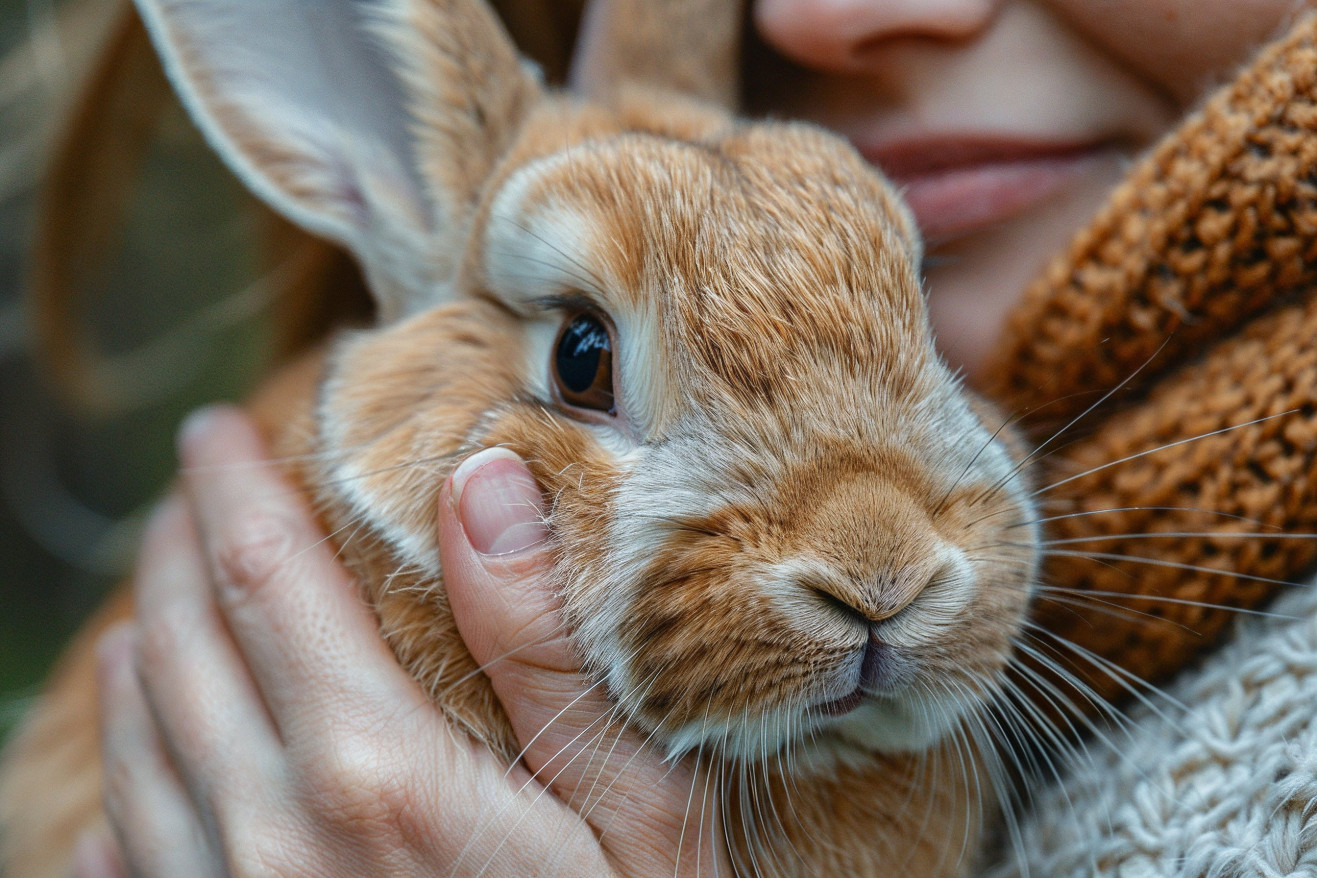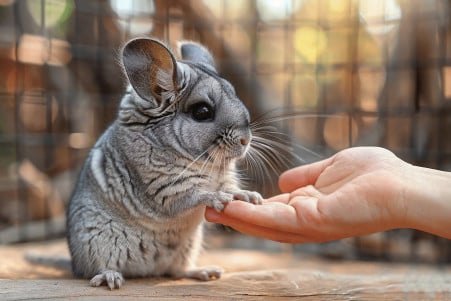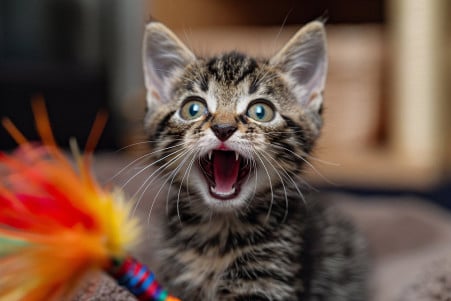Why Do Rabbits Bite? Understanding and Preventing Nipping Behavior
9 April 2024 • Updated 8 April 2024

While it's a popular belief that rabbits never bite, the reality is that these animals can and do bite their owners in certain situations. Rabbits may bite if they are scared or startled, if they are trying to get a treat from a person's hand, or if they are trying to establish dominance or territory - a behavior often referred to as "love bites" even though it's not actually a sign of affection.
This article will cover the most common reasons for rabbit biting and then go over expert tips for how to prevent and train rabbits out of this behavior. With a better understanding of why rabbits bite and some effective training methods, rabbit owners can ensure that they have a good relationship with their pets and keep biting to a minimum.
Why do rabbits bite?
Common Triggers of Bunny Biting
Fear and stress are the most common causes of rabbit biting, which is a natural response to fear in prey animals with a strong flight response. According to the Rabbit Welfare Association & Fund, rabbits can be startled by sudden movements, loud noises, or new environments and may respond with defensive biting. Meanwhile, illness or pain can lead to increased irritability and aggression, according to Animal Friends, Inc..
Hormonal changes during sexual maturity are another common cause. For example, RabbitHoleHay.com explains that some female rabbits become snappy when they are pregnant due to hormonal changes. Meanwhile, territoriality, such as protecting their space, toys, or food, can lead to nipping as a way of marking their territory, according to the Rabbit Welfare Association.
Lack of proper socialization, especially rough handling by children, can reinforce a rabbit's natural fear of humans and other potential predators. This underscores the importance of understanding rabbit behavior - as prey animals, their biting is often a defensive response rather than a sign of aggression. By recognizing these common triggers, owners can work to create a safe environment and employ positive reinforcement training to help prevent biting.
Hormones and Neutering
Hormones play a big role in rabbit aggression. Puberty can be a particularly difficult time for rabbits and their owners, as hormones can lead to an increase in aggression and territorial behavior. For example, Petplan states that un-neutered male rabbits are more likely to show signs of aggression, including biting, lunging, and spraying urine to mark their territory. Meanwhile, the Rabbit Welfare Association & Fund (RWAF) explains that spaying female rabbits can help reduce aggression and territorial behaviors that are driven by hormones.
Neutering rabbits can help reduce aggressive biting if it is done at the right time. It can also lead to better overall behavior. While neutering won’t prevent mood changes altogether, it can help reduce the severity of them. It’s important to talk to a vet about the right time to neuter a rabbit to ensure that you’re addressing hormonal aggression as effectively as possible.
Training and Socialization Methods That Work
Proper socialization early in life is important to avoid fear-based aggression in rabbits, according to Oxbow Animal Health. Gradual exposure to handling, along with positive reinforcement and treats, can help rabbits learn to accept human contact. Meanwhile, as WikiHow points out, offering treats can help calm and redirect an aggressive rabbit.
Meanwhile, staying calm and avoiding sudden movements and loud noises can help prevent rabbits from getting scared and lashing out with defensive bites, according to Petplan. In addition, creating a safe, stress-free environment that includes hiding places and toys can help reduce anxiety and territorial aggression, according to Petplan.
If biting issues persist or are especially severe, it may be helpful to work with a professional rabbit behaviorist or trainer. In addition, as Petplan notes, reaching out to organizations like the Rabbit Welfare Association & Fund can offer expert help in dealing with aggressive behavior. By using these methods, rabbit owners can help their pets feel safe and secure, which can reduce the likelihood of biting.
Proper Handling and Interaction Techniques
Because rabbits can see nearly 360 degrees around them, sudden movements or someone coming at them from the side can be perceived as a threat, which can lead to defensive biting. Therefore, it is important to make sure that you are always interacting with your rabbit in a calm and gentle manner and letting them come to you on their own terms, as the Rabbit Haven notes.
When picking up a rabbit, it is also important to make sure that you are supporting their body, not just picking them up by the scruff of their neck or their ears, which can be very stressful and even cause injury, according to the RSPCA. Children should be supervised when handling rabbits, as rough handling can lead to fear and biting, according to the Rabbit Haven.
Finally, making sure that you are always paying attention to your rabbit's body language and making sure that they have a place to hide or escape to can help prevent them from feeling cornered and biting out of fear, according to Home & Roost. By learning and following these proper handling techniques, rabbit owners can reduce the likelihood of biting and build a more positive, trusting relationship with their pets.
First Aid and What to Do If a Rabbit Bites
If a rabbit does bite, it's important to stay calm and not punish or react aggressively, as this can make the behavior worse. According to the Mayo Clinic, for minor bites, the wound should be washed thoroughly with soap and water, an antibiotic cream or ointment applied, and covered with a clean bandage.
For deeper or more severe bites, signs of infection, or concerns about potential diseases from wild rabbits, medical attention should be sought promptly. As BunnyLady.com explains, basic first aid is usually sufficient for rabbit bites, but it's important to monitor for any concerning symptoms.
It's also important to figure out why the rabbit bit in the first place so that the behavior can be addressed and prevented in the future. The HSE stresses the importance of being patient and asking a vet or rabbit behaviorist for help, especially if the rabbit's biting is ongoing or severe. With the right care, rabbit owners can make sure that they and their pets stay safe and healthy.
How to Prevent Your Rabbit From Biting
With patience, training, and a good understanding of rabbit behavior, it is possible to prevent and minimize biting. Creating a safe and stress-free environment, dealing with any medical or hormonal problems, and respecting the rabbit's space are all important.
Regular socialization and positive reinforcement can help rabbits get used to being handled and interacting with people. If biting problems persist, it may be helpful to seek help from a vet, animal behaviorist, or experienced rabbit owner. By building a relationship based on trust and understanding, rabbit owners can enjoy a close and happy bond with their pets.


